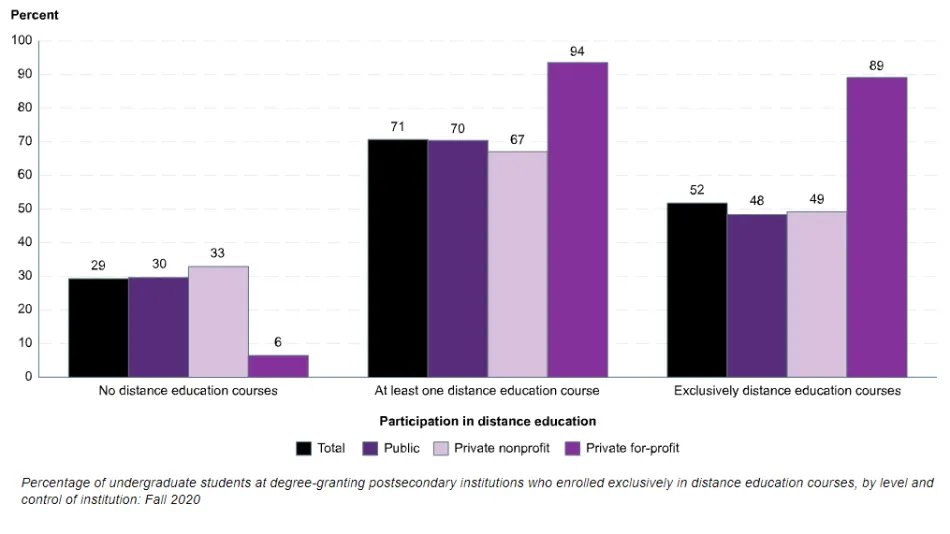In today’s digital age, online education has gained significant popularity, offering individuals the opportunity to pursue higher education from the comfort of their own homes. However, many individuals remain skeptical about the difficulty level of online college compared to traditional brick-and-mortar institutions. In this article, we will delve deeper into the challenges of online education and also explore its unique benefits.
Is Online College Harder?
Online college presents its own set of challenges that differ from the traditional classroom setting. However, it is essential to note that the difficulty level ultimately depends on various factors, including personal learning style, self-discipline, and time management skills. Let’s take a closer look at some of the challenges and benefits of online education.
As per the National Center for Education Statistics, in the fall of 2020, approximately 71 percent of postbaccalaureate students, totaling around 2.2 million individuals, enrolled in at least one distance education course. Out of the total postbaccalaureate enrollment, 52 percent or approximately 1.6 million students exclusively took distance education courses. These percentages were higher compared to the figures from 2019. Specifically, in 2019, about 42 percent of all postbaccalaureate students (equivalent to 1.3 million individuals) enrolled in at least one distance education course, while 33 percent (approximately 1.0 million students) exclusively took distance education courses.

image by the National Center for Education Statistics
Challenges of Online Education
1. Self-Motivation and Discipline
One of the primary challenges of online education is the need for self-motivation and discipline. In a traditional classroom, students have a structured environment, face-to-face interactions with instructors, and immediate feedback. In the online setting, students must be proactive in managing their time, completing assignments, and staying motivated without the external pressure of a physical classroom.
2. Lack of Face-to-Face Interaction
Online college can feel isolating, as most communication and interactions with instructors and peers occur through digital platforms. The absence of face-to-face interaction can make it challenging for students to build relationships, collaborate effectively, and seek immediate clarification from instructors. This lack of personal connection may lead to feelings of isolation and hinder the development of social skills.
3. Technical Difficulties and Learning Platforms
Technical difficulties can pose significant challenges in online education. Issues such as internet outages, software compatibility, or learning platform glitches can disrupt the learning process and cause frustration. Additionally, students who are not familiar with using technology for educational purposes may face a learning curve in adapting to various digital tools and platforms.

4. Time Management and Balancing Responsibilities
Balancing work, family, and education can be demanding for online college students, especially adult learners. Without a set schedule or physical attendance requirements, students must effectively manage their time and prioritize tasks to meet deadlines. This requires exceptional organizational skills and the ability to strike a balance between various responsibilities.
Benefits of Online Education
While online college presents its challenges, it also offers several unique benefits that make it an attractive option for many individuals.
1. Flexibility and Convenience
Online education provides unparalleled flexibility, allowing students to create their own schedules and learn at their own pace. This flexibility is especially beneficial for individuals with work or family commitments, as it allows them to pursue higher education without compromising their other responsibilities. With the power of an internet connection, students have the incredible freedom to access course materials and lectures whenever and wherever they please.

2. Access to Diverse Learning Resources
Online college provides access to a wealth of learning resources. Students can explore virtual libraries, databases, and research materials to enhance their understanding of the subjects they are studying. Additionally, online education often incorporates multimedia elements, such as videos, interactive quizzes, and simulations, to create engaging and immersive learning experiences.
3. Personalized Learning Experience
In an online college setting, students have the opportunity to tailor their learning experience to their individual needs. They can review lectures and course materials at their own pace, rewind or fast-forward through content, and revisit concepts as needed. This personalized approach allows students to focus on areas that require more attention and spend additional time on challenging topics.
4. Global Networking and Collaboration
Online education transcends geographical boundaries, enabling students to connect and collaborate with peers from around the world. Through online discussion boards, forums, and virtual group projects, students can engage in meaningful interactions, share diverse perspectives, and develop a global network of contacts. This exposure to different cultures and viewpoints enhances the overall learning experience and prepares students for the globalized workforce.
Schools Offering Online College Education
University of Phoenix: Empowering Students with Flexibility and Support
Flexibility, Interactivity, and Supportive Services
The University of Phoenix is renowned for its commitment to providing a wide range of online degree programs that cater to diverse academic interests. The institution’s flexible scheduling options ensure that students can balance their education with other commitments, such as work or family responsibilities. Additionally, interactive online classrooms foster a collaborative learning environment where students can engage with both their peers and professors. The University of Phoenix also places great emphasis on comprehensive student support services, ensuring that students have access to the resources they need to thrive academically.
Southern New Hampshire University: Personalized Approach and Extensive Resources
Tailored Online Education and Student Success
Southern New Hampshire University stands out for its personalized approach to online education. The institution offers a variety of online degree programs across various disciplines, allowing students to pursue their academic passions. By providing a supportive and interactive learning environment, Southern New Hampshire University ensures that students receive the individual attention they need to succeed. The university’s commitment to student success is further demonstrated through its extensive resources, which include academic advising, career services, and online tutoring.
Penn State World Campus: Accredited Programs for Diverse Fields
Robust Online Learning and Accredited Programs
Penn State World Campus is a reputable institution known for its robust online learning platform and extensive selection of accredited online programs. The university offers a wide range of degrees in fields such as business, information technology, healthcare, and more. Through their online programs, students can acquire the knowledge and skills necessary for their desired careers. Penn State World Campus is dedicated to maintaining high academic standards, ensuring that students receive a quality education that is recognized and respected in their chosen field.
Arizona State University Online: Innovation and Engaging Experiences
Diverse Degree Programs and Interactive Learning

Arizona State University Online is at the forefront of innovation in online education. The university offers a diverse range of online degree programs, including bachelor’s, master’s, and doctoral degrees, catering to various academic pursuits. Arizona State University Online prioritizes interactive and engaging learning experiences, leveraging advanced technologies and multimedia resources to enhance student comprehension and engagement. By fostering an environment of innovation and creativity, the institution prepares students for the evolving demands of the modern workforce.
Liberty University Online: Faith-Based Learning and Supportive Environment
Christian Values and Extensive Program Offerings
Liberty University Online, one of the largest Christian universities globally, offers a wide array of online programs infused with Christian values. The institution creates a supportive and faith-based learning environment, where students can grow academically and spiritually. Liberty University Online places great emphasis on nurturing the whole person, helping students develop not only intellectually but also ethically and morally. Through their online programs, students can explore their faith while pursuing their academic goals.
These institutions are just a glimpse of the many reputable universities in the United States that provide an exceptional online college education. When considering an online degree program, it is crucial to conduct thorough research and choose an institution that aligns with your academic and career aspirations. By selecting a reputable and accredited university, you can embark on a rewarding educational journey that opens doors to a bright future.
The Signup Process for Online Courses
The signup process for online courses may vary slightly depending on the institution. However, the following general steps are typically involved:
- Research and Select a Program: Explore the online programs offered by different institutions and choose the one that suits your interests and career aspirations.
- Visit the School’s Website: Visit the official website of the chosen institution and navigate to the online education section. Here, you will find detailed information about the programs, admission requirements, and application procedures.
- Complete the Application: Fill out the online application form provided by the institution. This typically includes personal information, educational background, and any relevant work experience.
- Submit Supporting Documents: Depending on the program and institution, you may be required to submit additional documents such as transcripts, letters of recommendation, and a personal statement. These documents play a crucial role in enabling the admissions committee to assess and evaluate your qualifications effectively.
- Pay Application Fees: Some institutions may require an application fee to process your application. Be sure to check the fee amount and payment methods accepted.
- Financial Aid and Scholarships: If you require financial assistance, explore the financial aid options and scholarships offered by the institution. Submit any necessary forms or documents to apply for financial aid.
- Await Admission Decision: After submitting your application, you will need to wait for the admissions committee to review your materials. The duration of the decision-making process varies among institutions.
- Acceptance and Enrollment: If you receive an acceptance letter, review the terms and conditions of the offer. Follow the instructions provided to confirm your enrollment and secure your place in the online program.
FAQs about Online College Difficulty
1. Is online college harder than traditional college?
Online college can be more challenging for some individuals due to the self-directed learning style, lack of face-to-face interaction, and technical difficulties. However, it is important to remember that difficulty levels vary for each person.
2. Can I balance a full-time job while attending online college?
Balancing a full-time job and online college is possible but requires effective time management skills and careful planning. It may be necessary to make adjustments to work hours or seek support from employers to create a manageable schedule.
3. How can I stay motivated in an online college environment?
To stay motivated in an online college environment, create a study routine, set achievable goals, engage with peers through online forums, and establish a support system to hold yourself accountable.
4. Are online degrees less valuable than traditional degrees?
Online degrees hold the same academic value as traditional degrees, provided they are obtained from accredited institutions. Employers recognize the importance of online education and value the skills acquired through online programs.
5. What resources are available to help online college students succeed?
Online colleges often provide comprehensive support services, including academic advisors, online libraries, tutoring services, and virtual student communities. These resources can help students succeed in their online education journey.
6. How can I overcome the challenges of online education?
To overcome the challenges of online education, develop effective time management skills, stay organized, seek support from instructors and peers, maintain open lines of communication, and actively participate in online discussions.
In Conclusion
While online college presents its unique challenges, it is important to recognize the benefits it offers. The difficulty level of online education varies depending on individual factors, such as learning style and time management skills. By addressing the challenges through self-motivation, discipline, and effective time management, students can overcome the hurdles and succeed in the online learning environment.
Online education offers flexibility, access to diverse resources, personalized learning experiences, and opportunities for global networking and collaboration. It provides individuals with the chance to pursue higher education regardless of their location or personal circumstances. By embracing the advantages of online education and navigating the challenges, students can unlock the potential for personal and professional growth.
Good luck in your education journey!





